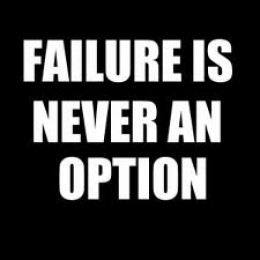Does success breed success or failure?
Does success breed success or failure?
There are some that believe that success breeds success. There are many others, like myself, that believe failure breeds success. If you think that the later is true, how do we encourage that in our businesses and with our employees? Is there an acceptable percentage of failure or perhaps failures we can more readily accept and improve upon with damaging the company's bottom line or reputation?
“Success breeds success.”
With all due respect, we disagree.
Success does not breed success.
At least not directly.
And in some cases, success actually breeds failure.
Success breeds success, but only indirectly
Success breeds affirmation. You’re on the right track. You’re doing the right things.
Success breeds confidence. You did well. You’re going to reach BIGG success.
Success breeds enthusiasm. Achieving a goal is fun. It’s easy to get excited about reaching for even bigger goals.
Success breeds energy. You can’t wait to get started on your next goal. You’re all pumped up, ready to go!
Success breeds all of these factors. You bring them all to your next BIGG thing.
How can you help but win? But sometimes it doesn’t work out that way…
Success breeds failure
Sometimes, success leads to failure. This happens indirectly as well.
We’ve seen it happen many times. We help small business owners start a second business.
We share with them the 15 most common mistakes that people make when starting a second business.
Seven of them are related to this attitude of success breeding success. Specifically, they get too confident.
They make poor decisions or execute poorly because of this over-confidence. It leads to failure.
It’s tougher to fail after an initial success than before. Generally, there’s more at risk financially.
And it’s especially difficult emotionally. You start to question whether the first time was just luck.
So success can breed success indirectly. But be on the alert for over-confidence so your success breeds BIGG success!
http://biggsuccess.com/2011/07/20/succe … d-success/It entirely depends on the family. Each family structure is different. Some force success on their own children, some allow their children to grow and prosper on their own pace, etc. The best family encourages their children to learn and develop mentally, physically, and psychologically but also teaches them their limits. There is a healthy balance.
Thank you, Leah, for your thoughts. I found it very interesting that your thoughts brought you immediately to family...perhaps that is where many people learn about success and failure first.
If you have success. You are more likey to have more.
Its just like winning when someone does well its make that person feel good. This can be like a drug this feeling and drives people to be more and to want more.I believe both failure and success breeds success in their own way. For failure to breed success, you've to depend on yourself to succeed by working harder and smarter, e.g. becoming more innovative. When you are already successful, you can then depend on others to help you become even more successful. People like winners, not losers. That's why they say: "Success breeds success."
Alifeofdesign, you must be thinking of intrapreneurship, when you ask: "If you think that the later is true, how do we encourage that in our businesses and with our employees?" Well, first is that the company must make it clear that it would not punish for failures, otherwise no one would want to take any risk. It should also spell out what the "carrot" is, so that people can decide whether it is worthwhile to take the risk.
The company should determine how much it could afford to lose, without adversely jeopardizing the company. When failure is expected to threaten the survival of the company, it's a no-no, unless the company is already critically ill, in which case it has nothing to lose. It's no point to take a do-or-die attitude, when the company is doing well.
What is the acceptable percentage of failure is actually subjective. A mediocre company can tolerate higher risk than a company that is doing very well. I guess the answer will depend, to a great extent, on the (1) cost-benefit; (2) the probability of success; and (3) the effect of failure.Success breeds success if the resultant output of previous success is invested for better avenues and failure if one gets haughty and proud and over confident of one's own skills.
For example a small success of putting 1% extra every day results into tremendous increase in efficiency whereas a 1% decrease everyday for 365 days results into a total diasaster.
1.01^365 = 37.8 and 0.99^365= 0.03
Related Discussions
- 2
Will Windows 8.1 be a success or failure?
by Sam Kear 12 years ago
Will Windows 8.1 be a success or failure?
- 6
The Theory of Success
by Grace Marguerite Williams 14 years ago
Success is a matter of planning, strategizing, and making opportunities. Furthermore, in order to succeed in a given arena, one must be proactive. Passive people are NEVER successful as life happens to them instead of they molding life to their expectations. Successful...
- 9
What separates repeated success in business from repeated failure?
by OpenConnect 14 years ago
What separates repeated success in business from repeated failure?What do you think is the main reason for some people to have repeated success in business while others have repeated failure?
- 3
Do you think that you have all the self confidence you need for success?
by Sophie 15 years ago
Do you think that you have all the self confidence you need for success?
- 5
A life with confidence
by Confidence101 14 years ago
If some unknown force were to endow you with the ability to accomplish your greatest dream without the possibility of failure, what would it be?
- 9
Do you believe that you have accomplished what you have solely because of what y
by Patricia Scott 13 years ago
Do you believe that you have accomplished what you have solely because of what you have done?Are you successful because of steps you took to become so? Didothers greatly influene your life so that you were able to achieve success? Sometimes individuals want to give up their attempt at achieving...











